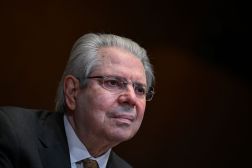Tomorrow’s CIO will play chief integrator role — Deloitte
As information technology becomes more vital to every unit within federal agencies, the CIO may come to resemble more of a chief integration officer than a chief information officer, a new report from Deloitte predicts.
New positions are appearing in federal technology units, like the chief data officer and chief analytics officer, and Deloitte Global Consulting Chief Technology Officer and Principal Mark White told FedScoop the public sector CIO has a unique opportunity in this changing landscape to bring all the pieces together.
The CIO’s role is to “step up and be the convener and the coordinator and ultimately the integrator of these other views of the impact of digital on the capabilities, operations, staffing and mission of government,” White said. The prediction comes as part of a new Deloitte report on tech trends the company believes will impact the public sector in the next 18 to 24 months.
“It’s a unique opportunity and one that can be challenging in the public sector where the gravitas or significance of a role is sometimes measured by the amount of budget and the amount of people it oversees and coordinates,” he said. “The temptation might be to feel threatened, but the recommendation is to obviously step up and play the coordination role.”
Deloitte’s report followed a unifying theme of integration, or as White and his team put it, “the fusion of IT and business.”
“Many technology leaders in the public sector suddenly find themselves operating not merely as enablers of broader strategies, but at the center of important decisions about strategy and the future of government,” the report says.
Another area where CIOs will need to step into perhaps unfamiliar territory is talent management. Not only are the IT workers of today retiring from the federal government in huge numbers, but there’s also a growing skills gap in replacing them.
While CIOs may not be the most experienced when it comes to workforce management, White said they can adapt their skills of portfolio management to address talent.
“In your project portfolio, you literally go out and inventory what you have — you know what you have, you know what it costs you, you know where it’s used and therefore what it’s worth,” he said. “You have the view of what’s entering the portfolio, what’s getting developed, what’s mature and operating, and perhaps what’s aging and exiting the portfolio.”
That view of an entire talent “portfolio” gives CIOs an opportunity to recruit workers with science, technology, engineering and math, or STEM, skills more efficiently. But White also said it’s important to think bigger — to think about attracting talent in STEAM, where the “A” could stand for several things, like art, architecture or anthropology.
Those skills are “really unfamiliar and uncommon in the IT space but have everything have to do with the way humans engage with the world around them emotionally, mentally, physically, socially, and that’s what becomes important as we deploy these new and emerging technology capabilities,” White said.
Because so many IT leaders already have the technical skills, CIOs who have a better understanding of their workforce can also repurpose and retrain them with those softer skills, White argued.
“We have a lot of talented people we could retrain, reposition and redeploy from areas where we may be fully staffed or even [depreciating] particular technical skills and use those people who are accomplished IT practitioners with deep familiarity in the business and mission,” he said.






